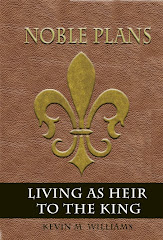I grew up in the age of astronauts landing on the moon and first-run episodes of
Star Trek. And while my enthusiasm for space and that final frontier has never abated, my heart is continuously stirred by the age-old stories of knights and daring-dos: of staring down the gullet of a fire-breathing dragon with only your wits and a sword. Of noble women and men putting everything on the line out of loyalty to a righteous ideal.
Even as I write this, the very thought of such noble deeds make my heart beat a little faster.
Few authors have fully captured the nuances, depth, and “reality” of nobility as Stephen R. Lawhead. His books kindled a fire in me many years ago and frankly, he cannot write fast enough to curb my appetite.
Stephen Lawhead is a best-selling author, largely in the fantasy genre. He also has an uncanny ability to slide biblical principles in under the radar so his works are equally popular in both the Christian and secular marketplaces. He weaves fiction together with history and culture, stitched together with elegantly believable characters, to create a artfully crafted and colorful tapestry.
Yes, if you cannot tell, I like his work. But Stephen Lawhead has accomplished far more than to merely entertain me. As I read, and re-read his texts, he was planting a hunger in me, a yearning for nobility in my daily life. I didn’t know it at the time. I had no idea he was covertly conspiring with the Holy Spirit to mold me.
But he did.
Here’s a sample:
I have seen a land shining with goodness where each man protects his brother’s dignity as readily as his own, where war and want have ceased and all races live under the same law of love and honor.
I have seen a land bright with truth, where a man’s word is his pledge and falsehood is banished, where children sleep safe in their mother’s arms and never know fear or pain.
I have seen a land where kings extend their hands in justice rather than reach for the sword; where mercy, kindness, and compassion flow like deep water over the land, and men revere virtue, revere truth, revere beauty, above comfort, pleasure, or selfish gain. A land where peace reigns in the hearts of men; where faith blazes like a beacon from every hill and love like a fire from every hearth; where the True God is worshiped and his ways acclaimed by all.*
I still feel a tug in my soul when I read that.
Thank you, Stephen Lawhead. You, along with J. R.. R. Tolkien, C. S. Lewis, and others have added such richness to my life, my family—and most of all—to my faith.
"A noble man devises noble plans; and by noble plans he stands"
*Arthur: the Pendragon Cycle by Stephen R. Lawhead, ©1989, Crossway Books, p.136







